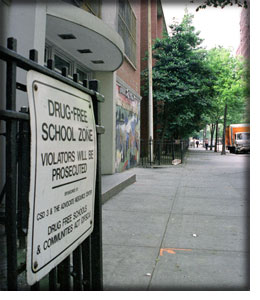
 As the presidential race kicks into high gear, FRONTLINE takes a look at a
top voter issue in the 2000 election, education. "The Battle over School
Choice" examines the passionate educational reform debate and its latest
catchword--providing greater "choice" for parents and children.
As the presidential race kicks into high gear, FRONTLINE takes a look at a
top voter issue in the 2000 election, education. "The Battle over School
Choice" examines the passionate educational reform debate and its latest
catchword--providing greater "choice" for parents and children.
Drawing on interviews with Al Gore and George W. Bush, as well as
interviews with national education experts, FRONTLINE looks at the pros
and cons of the various reform initiatives in several states.
In Ohio and Texas, vouchers and charter schools are sparking public debate.
Most of Cleveland's 4,000 voucher students are in Catholic
schools, and opponents argue that vouchers are siphoning off resources from
inner city schools. Critics--and the courts--also say that taxpayer-funded
vouchers for parochial schools violates the First Amendment's
separation of church and state.
But proponents counter that vouchers offer a "life raft" for low-income
students seeking a better education. And Cleveland parents tell FRONTLINE
vouchers are the only way for their children to escape a broken down public
school system.
While much of the education reform debate focuses on the "voucher wars,"
reforms are also occurring through alternative, charter schools which have
been created within the existing public school system. FRONTLINE profiles a
secular one in Cleveland run by two nuns which offers an oasis of safety in a
neighborhood of drugs and crime, and another alternative school in Austin,
Texas which is nurturing the community's most neglected children.
But FRONTLINE also highlights some controversial experiments: an Ohio charter
school which is modeled on a boot camp, and
a charter school chain in Ohio which is managed by a for-profit company and focuses on a
stripped-down education taught through computers.
The concluding parts of this report turn to Gore and Bush's track
records on education and their views on reform
initiatives. Both candidates say they are committed to school choice.
However, candidate Bush, while supporting student vouchers, was not a strong,
vocal supporter of them in Texas. And candidate Gore is opposed to private
school vouchers even though he sent his own children to elite private schools in
Washington D.C.
FRONTLINE compares the private school attended by Gore's son to
nearby Woodrow Wilson High where the students pass through metal detectors each day.
FRONTLINE 's cameras also visit Austin High, the upscale Texas public school
where Governor Bush's twin daughters are seniors. Although Bush inherited a successful
Texas education reform movement which had begun in the 1980s, Bush's
education policies have even drawn praise from one of his most acerbic critics, populist
Molly Ivins.
Despite the passionate differences of opinion surrounding school choice, some
educators feel the country's current focus on education reform presents an
opportunity for new experiments and changes. "I
think building stronger, more viable, more exciting public schools is the way,"
former New York chancellor Rudy Crew says. "This is a wonderful time.
This is really the most artistic that we have ever been asked to be."

home ·
what do the candidates say? ·
discussion ·
how bad are public schools? ·
is "choice" the answer? ·
my state
video excerpt ·
interviews ·
links ·
synopsis ·
tapes & transcripts ·
press
FRONTLINE ·
pbs online ·
wgbh
web site copyright WGBH educational foundation
 |